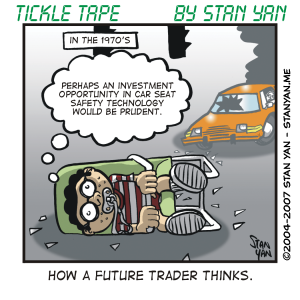Dreamers are often exalted because they dared to achieve the seemingly impossible, but unless one’s dreams match specific and realistic actions, little becomes of them. Without well-defined plans, aspirations can merely turn out to be pipedreams. That said, it is often useful to break away from real-world constraints and to daydream. Rather than bound our thoughts by the realistic restrictions that stop us dead in our tracks, one can dream about the perfect set of circumstances that will ensure success. Lifting all restrictions, such as cost, internal/external politics, or technology can produce creative solutions to even the most difficult problems.
In your mind consider what characteristics describe an ideal trader. What attributes would you list? This exercise can be useful. It will allow you to consider the characteristics that define the ideal trader and compare yourself to the ideal. A comparison may create awareness of realms that you’ve never considered, areas that may be impeding your ability to reach the level of success you desire or expect.
For example, perhaps the single most important characteristic for someone to thrive in any field is a pure, unadulterated passion to succeed. Unadulterated means that the primary motivation is to become the best—not the richest, most famous, or the most often seen on CNBC. The very best traders are people that would be trading even if they were not making big money. It is a passion for trading that gives them the focus to concentrate on their objective, to spend the time and energy to learn this business thoroughly and to endure the inevitable setbacks indigenous to trading.
However, most traders’ motives are mixed. Their motivation is often adulterated with dreams of unlimited financial success and la dolce vita. But just because your motivation is weakened by self-serving needs of fame and fortune, that doesn’t mean that you can’t become a successful trader. By airing these feelings and questioning one’s motives, a trader can develop the proper kind of motivation. It’s better to acknowledge how your motives may be influenced by base human needs than to pretend these powerful desires have no influence.
There are other characteristics that the ideal trader should possess, yet many traders lack. The ideal trader is fearless. He or she can put on a trade with unfailing objectivity. You may know of some traders who are fearless and lose big because they don’t take proper risk controls. So although complete objectivity is a desirable characteristic, it must be tempered with a healthy skepticism of the markets. There are instances when the ideals are hard to pin down, and the right balance between risk-seeking and risk aversion is one of those areas.
Besides the psychological characteristics, one can dream of other areas where working under ideal circumstances can ensure success. An arsenal of tried and true winning trading strategies and virtually unlimited trading capital exemplify the ideal, for example. These circumstances are certainly a fantasy, but thinking of them is a useful exercise. One is able to consider all possibilities, both achievable and unrealistic, and identity how close he or she is to the ideal. Such self-exploration allows you to identify what you can and cannot change, and in the end, it’s informative to know where you stand.


